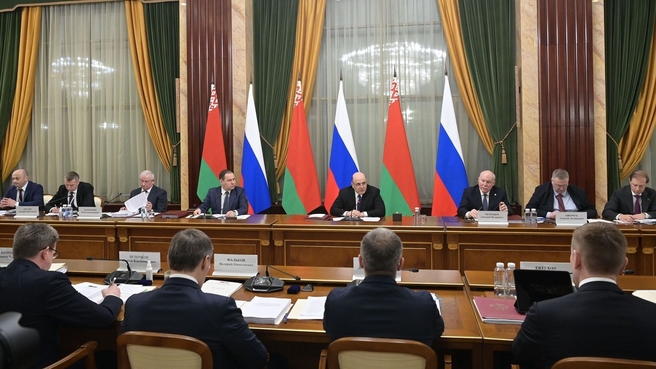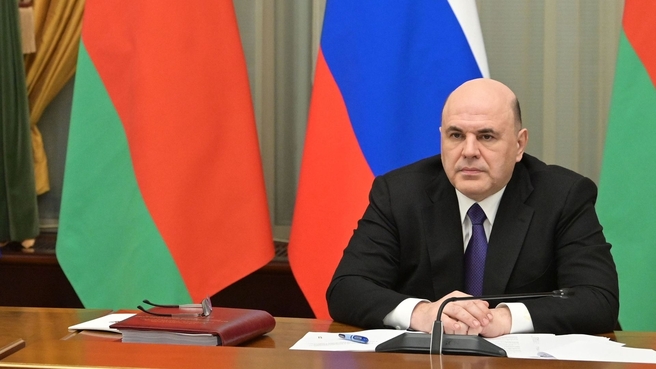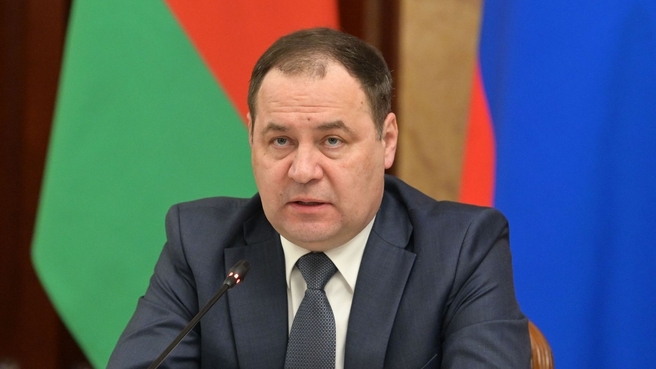Prime Minister and Chairman of the Council of Ministers of the Union State Mikhail Mishustin and Prime Minister of the Republic of Belarus Roman Golovchenko chaired a meeting of the Council of Ministers of the Union State.
Mikhail Mishustin’s opening remarks
Roman Golovchenko’s opening remarks
Excerpts from the transcript:
Mikhail Mishustin: Good afternoon, Mr Golovchenko and Mr Mezentsev, colleagues.
I am happy to welcome you all in Moscow, at a meeting of the Council of Ministers of the Union State. First of all, I would like to convey best wishes from President of Russia Vladimir Putin.
We are meeting ahead of a highly important event. At the end of the week, on 2 April, we will be marking the Day of Unity between the Peoples of Russia and Belarus. The treaty on establishing a community of our countries was signed on that day, over 25 years ago. It opened a new page of our common history and ushered in the Union State’s integration projects.
Today, one can safely say that the decision to establish it was correct and justified.
Together we are stronger, we are able to tackle the most complex challenges, with the tasks facing us in a variety of areas, from ensuring security to improving the wellbeing of our citizens. And, of course, to resist external pressure. The deepening of Russian-Belarusian integration was our response. This is the task set before us by our presidents, Vladimir Putin and Alexander Lukashenko.
Despite the instability on global markets and the sanctions aggression of the collective West, our economic cooperation is prospering. Mutual trade posted a significant growth of 35 percent in 2021, which further increased by 12 percent and reached a record high of $45 billion last year. The positive trend continues.
This, among other things, is the result of implementing a set of decisions to reorient Belarusian exports from Western markets to Russia. The import of your products increased by 40 percent and for the first time ensured a positive balance of trade with Russia for Belarus.
Together we continue to take effective measures to level the negative consequences of the unprecedented sanctions against our countries.
Russia, for its part, supported its fraternal republic in strengthening its financial and budgetary stability. As per tradition, we granted preferences in the supply of energy resources. We helped establish alternative transit routes to friendly states using the Russian transport infrastructure.
We are also building up industrial cooperation. We implement 20 joint projects in the areas for which there is high demand. We are talking primarily about mechanical engineering and electronics.
We have good potential here: we have talented personnel and good groundwork, which needs to be fully developed.
I believe that joint initiatives will yield practical results: help create new jobs and produce a wide range of advanced products with our own equipment, machinery and components, which is important for achieving independence from foreign solutions and ensuring the stable operation of our enterprises.
In this regard, I would like to thank our Belarusian colleagues for the attention paid at the state level to the development of interregional and sister city relations. Mr Golovchenko, I know that you have set yourself the goal to visit Russian regions at least once a month this year. We are happy to support this initiative. You have already been to Nizhny Novgorod and Ulyanovsk. I know that you are planning to go to Volgograd today after our meeting. Your other trips are also being prepared. You are welcome to visit all Russian regions.
We are confident that the 10th Forum of the Regions of Russia and Belarus will be a great success. Scheduled to take place in Ufa in June, it will be a good opportunity to establish new useful contacts and, I am sure, will also serve to launch promising new projects.
Colleagues,
Let us get down to today’s agenda.
Almost a year and a half ago, in November 2021, President of Russia Vladimir Putin and President of Belarus Alexander Lukashenko adopted a fundamental decision to deepen integration. The Main Areas for the Implementation of the Treaty on the Creation of the Union State, as well as 28 sectoral union programmes, were approved. And they set, one might say, the direction in which all integration processes will develop in the near future.
We have laid the foundations for a coordinated macroeconomic, agricultural and industrial policy. We are forming a common transport market, competition rules, and ensuring equal consumer rights. Our main task is to raise the standard of living of the citizens of Russia and Belarus, to achieve the growth of our economies, and to form a common space based on the principles of openness, transparency and mutual trust.
The Russian and Belarusian governments are actively cooperating in all these areas. I am glad to note that we are acting truly consistently, coordinating all decisions as a team.
Now two thirds of the arrangements have been completed. Let us keep up the momentum.
The tasks of creating a favourable business climate are being addressed. We are consistently removing barriers and restrictions on the free movement of goods, services, capital, and labour.
I believe that the best practices can and should be offered to our neighbours both in the Eurasian Economic Union and the Commonwealth of Independent States, including Russian-Belarusian experience in the taxes, customs, and traceability of goods. The benefits are obvious: more effective control in the market, suppression of illegal import channels, and, most importantly, protection of consumers from counterfeit goods, fakes and, as a result, more favourable and transparent conditions for businesses.
The agenda of today’s meeting of the Council of Ministers includes summing up the development of trade and economic cooperation over the past two years. Let us discuss the progress made in implementing the agreements on deepening economic integration. We will also focus on strengthening cooperation in space research, as well as microelectronics, electronic components, and electronic engineering.
Let us discuss the Strategy for Scientific and Technological Development of the Union State. An intergovernmental agreement on scientific, technical and innovative cooperation will be signed following the meeting.
It is important to step up work to strengthen the technological sovereignty of Russia and Belarus, to use the advantages of our countries and to conduct joint applied research, as well as the implementation of mega-science projects.
Friends,
The Union State has a great future in the emerging multipolar international architecture. Deepening integration will serve the prosperity of the two countries.
The result of today’s work will be preparation for the upcoming meeting of the Supreme State Council of the Union State with the participation of our presidents, Vladimir Putin and Alexander Lukashenko. It will give a new boost to the development of fraternal Russian-Belarusian relations.
Mr Golovchenko, please, you have the floor.
Roman Golovchenko: Mr Mishustin, Mr Mezentsev, meeting participants.
This is the first meeting of the Council of Ministers of the Union State in the new geopolitical conditions associated with the unprecedented harsh and illegal measures of external pressure on our countries.
Contrary to the intentions of certain Western politicians, our economies were not swept away by economic crises. We have maintained the macroeconomic and financial stability of the Russian and Belarusian economies. Industrial enterprises are operating steadily, increasing production and speeding up import substituting processes.
In response to Western sanctions, we have introduced coordinated measures of strategic importance, aimed primarily at strengthening the potential of Belarus and Russia and further developing the Union State. They include a fundamental decision on settlements in Russian roubles, approval of energy pricing formulas, coordination of promising import-substitution projects, and signing of a number of fundamental agreements, including on the transshipment of petroleum products and foreign trade cargo, on shipping, and on cooperation in microelectronics, as well as many other things that Mr Mishustin has already mentioned in his remarks.
Mr Mishustin, I would like to express my gratitude to you and all members of the Russian Government for your large personal contribution to finding mutually beneficial solutions and supporting our joint projects.
Belarus approached the implementation of the allied programmes with great responsibility. The two countries’ departments have completed almost 75 percent of the total number of tasks as part of their joint work, and eight programmes have been fully implemented. More than 100 legal acts, such as laws, agreements, and resolutions have been adopted.
I believe that today everyone believes that the package of these integration documents was adopted at the right time back in 2021. There are still unresolved issues. But we find ways to overcome bottlenecks, using all the tools at our disposal.
I would like to note that despite the fact that more than a year has passed since the last meeting of the Council of Ministers of the Union State, interaction was carried out at a high organisational level.
Last year we adopted 42 regulations, three resolutions and one directive, including, I will note, decisions aimed at de-bureaucratising the procedure for adopting Union State programmes and projects, removing restrictions in the implementation of these projects, which are financed from the Union budget, and this made it possible to improve the efficiency of all areas of cooperation.
Momentum in bilateral work is also set by our countries’ leaders, who have a very busy and tight schedule of mutual contacts. The result of such systemic and purposeful work is patently obvious. Mr Mishustin has already mentioned the figures for foreign trade, which reflect the efforts that we are making together.
Interregional cooperation also played an important role in this. Last year, over 100 delegations of various levels from the Russian regions visited Belarus. Almost the same number of Belarusian delegations visited the Russian regions. It is true that as head of the Government I also try to make visits as often as possible. Mr Mishustin, I would like to invite you to visit Belarusian regions when possible.
At the same time, maintaining the growth dynamics achieved in bilateral trade, as well as the fulfilling tasks set by the heads of state, require the adoption of additional measures aimed at abolishing the remaining obstacles to the mutual supply of goods, levelling the operating conditions for our countries’ enterprises, and eliminating the remaining barriers and restrictions.
It is necessary to speed up the implementation of the signed intergovernmental agreements on a common industrial policy and the recognition of technological operations within the Union State. After all, they are aimed primarily at ensuring the rapid development and sustainable growth of industry in Belarus and Russia.
We believe it is necessary to step up efforts to expand bilateral cooperation, including in industry. In order to increase involvement in cooperation chains, our ministries of industry need to speed up the development and implementation of legal mechanisms for the recognition of technological operations. At the same time, we believe it is important not to scatter finances or create duplicate production facilities. Moreover, both Belarus and Russia have retained and developed competencies in various industries, which are largely complementary.
The transport and logistics sector is the next area for deepening cooperation. One of the main reasons for the rise in prices for goods, which we have all faced, is the increased cost of transportation due to changes in the previous logistics schemes. It is necessary to strengthen the coordination of actions between parties in the transport sector in response to increased sanctions pressure.
An entire package of agreements that have been signed in this area and are at a high stage of readiness are aimed precisely at bringing down the price factor, which affects the cost of our goods due to changes in logistics.
The heads of state discussed the main issues of forming the united energy markets of the Union State.
As a result of agreements reached at the highest level, a protocol on gas prices for Belarus was signed, and let me remind you that this is the first time it has been agreed for a three-year period.
In order to strengthen our countries’ independence in matters of digital development, it is necessary to intensify cooperation on software import substitution. We are talking, in particular, about the recognition of the electronic digital signature, providing access for citizens to the digital platforms of our two countries so that they are able to use electronic public and other services.
Friends,
Today’s meeting reflects our governments’ intention, as I am absolutely sure, to strengthen the Union State across the board. The agenda is highly relevant. I hope that today’s agreements and decisions will be backed up by subsequent concrete actions by the two countries’ governments and implemented in full.











